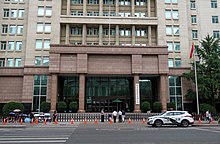State Administration for Market Regulation
The State Administration for Market Regulation (SAMR; 国家市场监督管理总局) is a Chinese ministerial-level agency directly under the State Council of the People's Republic of China responsible for market supervision and management. SAMR was established in 2018. It is China's primary antitrust regulator.
| 国家市场监督管理总局 | |
 Headquarters Entrance (Beijing) | |
| Agency overview | |
|---|---|
| Formed | 2018 |
| Preceding agencies | |
| Jurisdiction | |
| Headquarters | 8 East Sanlihe Rd, Xicheng District, Beijing |
| Agency executives | |
| Parent agency | State Council |
| Website | www |
| State Administration for Market Regulation | |||||||
|---|---|---|---|---|---|---|---|
| Simplified Chinese | 国家市场监督管理总局 | ||||||
| Traditional Chinese | 國家市場監督管理總局 | ||||||
| |||||||
Function
editSAMR is China's primary antitrust regulator, although its authority also has some overlap with the National Development and Reform Commission and the Ministry of Industry and Information Technology.[1]: 29 It also has regulatory functions involving data regulation and labor issues.[2]: 39 The E-Commerce Law is part of SAMR's broader mandate, and therefore it is a significant regulator in the area of e-commerce in China.[1]: 114
As of at least 2024, the SAMR provincial agencies for Jiangsu, Zhejiang, and Shanghai have been particularly active in antitrust enforcement.[1]: 30
SAMR's antitrust enforcement approach has been more stringent than pre-SAMR enforcement, and has remained more stringent as of at least early 2024.[1]: 111
History
editThe Administration was created in the 2018 Chinese overhaul of government administration, and merged or abolished a number of previous agencies, such as the State Intellectual Property Office.[2][3] SAMR was created under the banner of the Central Comprehensively Deepening Reforms Commission under Xi Jinping, current General Secretary of the Chinese Communist Party.[3]
The Administration consolidates in one ministry the market regulation functions previously shared by three separate agencies, the General Administration of Quality Supervision, Inspection and Quarantine (AQSIQ), the China Food and Drug Administration (CFDA), and the State Administration of Industry and Commerce (SAIC).[4]
In 2018, SAMR began a probe into Pinduoduo following the company being criticized extensively in domestic media for its selling of shanzhai and counterfeit products.[1]: 34
In November 2020, SAMR issued antitrust guidelines which addressed platform economy company issues.[1]: 111 These guidelines came into effect in February 2021.[1]: 111 Among other provisions, the guidelines state that variable interest entity structures will no longer be exempt from merger review and that SAMR may investigate acquisitions of emerging platforms even when the parties turnover does not meet notification thresholds.[1]: 111
In March 2021, Xi Jinping stated that China would strengthen anti-trust enforcement to ensure healthy healthy and sustainable development of the platform economy.[1]: 100 In November 2021, SAMR's antitrust bureau was upgraded to vice ministerial status following the appointment of Gan Lin as the bureau's new chief.[1]: 100
Leadership
edit
|
|
References
edit- ^ a b c d e f g h i j Zhang, Angela Huyue (2024). High Wire: How China Regulates Big Tech and Governs Its Economy. Oxford University Press. ISBN 9780197682258.
- ^ a b "China's New Market Regulator SAMR: A Short Primer". China Briefing News. Dezan Shira & Associates. 11 October 2018. Archived from the original on 24 April 2019. Retrieved 15 March 2019.
- ^ a b "China's New State Administration for Market Regulation: What to Know and What to Expect". Ropes & Gray. 3 April 2018. Archived from the original on 25 August 2019. Retrieved 15 March 2019.
- ^ "China: China Announces Revamped Market Regulation Administration | USDA Foreign Agricultural Service". Foreign Agricultural Service – U.S. Department of Agriculture. 26 October 2018. Archived from the original on 31 October 2018. Retrieved 15 March 2019.